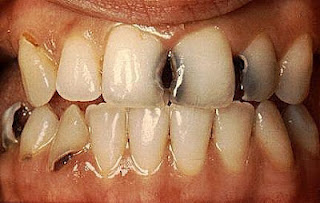Specialists in periodontitis has long been aware of the danger of smoking. Smokers are more at risk of periodontal disease than non-smokers. The result is mainly the compromised immune system.
Tobacco inhibits resistance, thanks to which bacteria have effective access to periodontitis. Therefore, researchers are hopeful that these results will contribute to the awakening of social consciousness.
The researchers, having examined more than 12 thousands of people, found that people who smoke more than and and a half pack of cigarettes a day are six times more likely to develop periodontal disease than nonsmokers, and those who smoke less than half of pack a day - almost three times.
The survey of U.S. scientists shows that in the United States periodontal disease is typical of African Americans and people with low income. The scientists, however, have reassuring news for ex-smokers: 11 years after quitting smoking the risk of periodontal disease is the same as in case of people who have never smoked.
How, then, is the situation of smokers in Poland? Smokers in Poland compose a relatively large number comparing to other European countries. 34% of Poles above 15 years of age smoke. The number of smokers decreases slowly. In 1997, there were 36% of smokers.
Every fifth smoker (21%) started smoking cigarettes before the age of 15. Almost twice as many men (44%) than women (24%) smoke. Most smokers are among 40-49-year-olds - 46%. More likely to smoke are people with secondary or vocational education (42%), manual workers (51%) and the unemployed (52%).
The largest group (59%) are the ones who smoke up to one pack a day (11-20 cigarettes). Every tenth person smokes over 20 cigarettes a day. A quarter of smokers smokes from 6 to 10 cigarettes a day. 5% smokes up to five cigarettes. Almost two fifths of smokers want to quit, but nearly half has not intended to abandon it.
The study was conducted between 12 and 15 on Poles above 15 years of age.
Smokers should take proper oral hygiene and visit dental office for
hygiene cleaning aborad more often than non-smokers.











